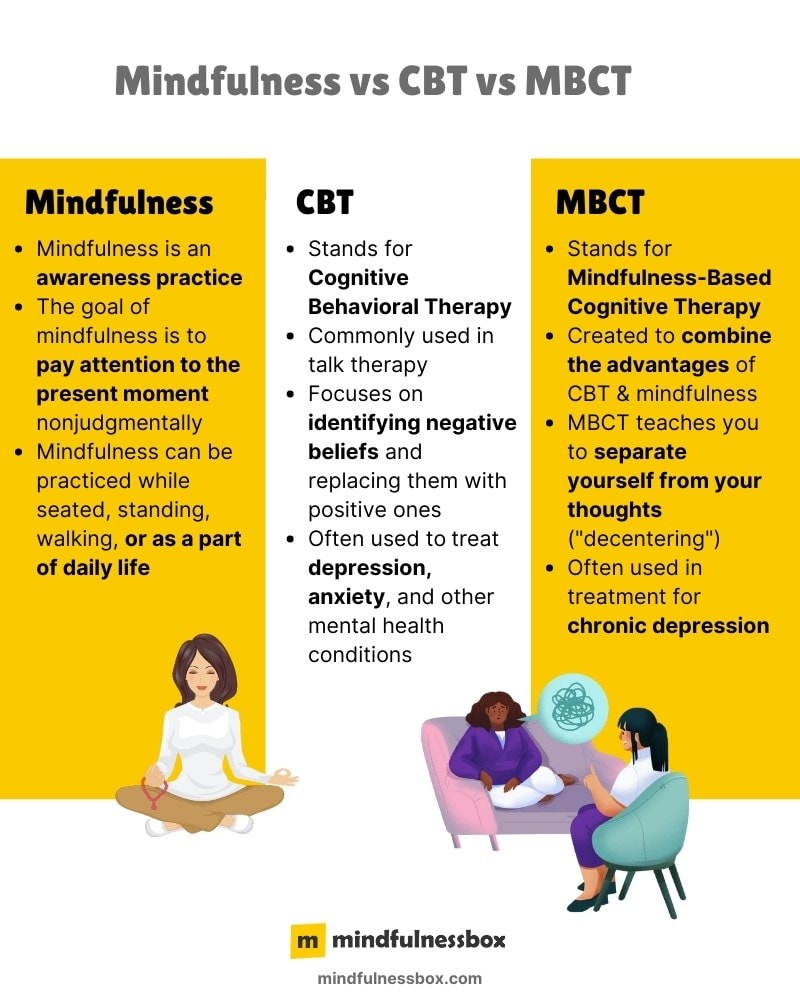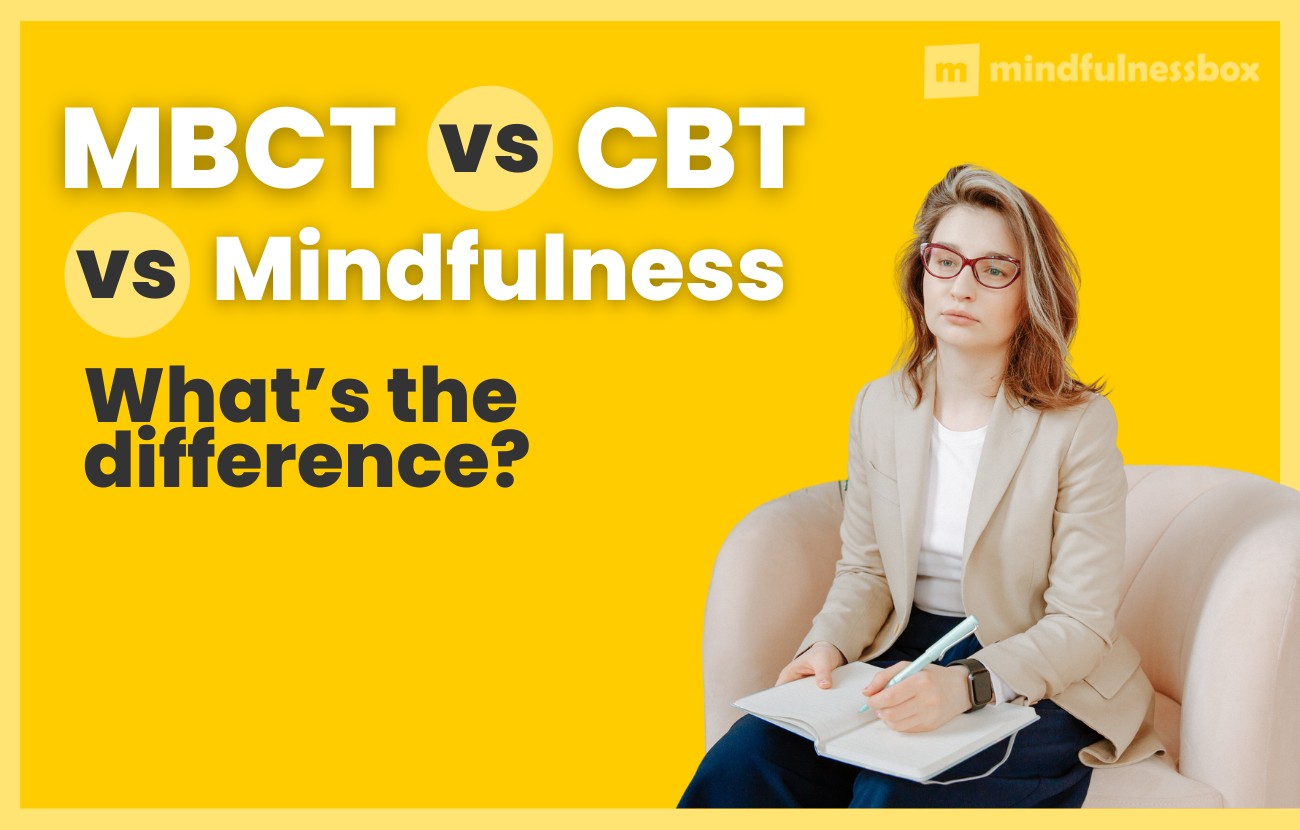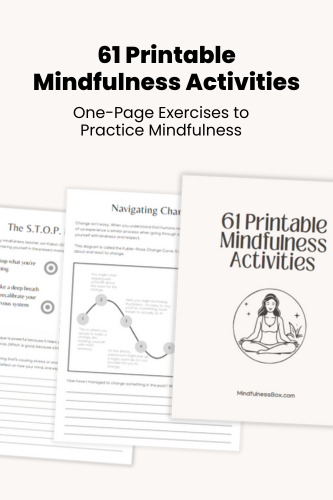Cognitive Behavioral Therapy (CBT) is a method to analyze troubling situations in your life, notice which of the beliefs that you hold are negative or inaccurate, and replace the negative beliefs with positive beliefs. A method called Mindfulness Based CBT (MBCT) combines CBT with Mindfulness.
If you’re practicing mindfulness, you might notice some similarities when exploring CBT and MBCT—especially around identifying emotions that come up for you, and noticing how they make you feel.
Mindfulness, CBT, and MBCT share some traits, but they are distinct practices.
Get dozens of one-page exercises to help practice mindfulness, meditation, gratitude, and self love. Perfect for printable handouts when teaching mindfulness to groups, students, or in the workplace.
To see examples, plus a full list of the 61 exercises included, click below.
Below, we’ll explore what makes these practices different from one another, and share situations for which each is commonly recommended.
First, let’s define the terms

You’re about to enter a world of acronyms, so let’s take a moment to define them so things don’t get too confusing.
Mindfulness is the ancient tradition of paying attention to our thoughts, our feelings, and the sensations in our body, and observing them in the present moment without judgment.
Cognitive Behavioral Therapy (CBT) is the “gold standard in psychotherapy.” CBT is a psychotherapy treatment that helps people identify negative and inaccurate beliefs about themselves and their experiences, and replace them with positive ones.
Mindfulness-Based Cognitive Therapy (MBCT) is a newer method of psychotherapy that combines cognitive therapy with mindfulness and meditation.
Mindfulness vs CBT

The main difference between mindfulness and CBT is that mindfulness does not involve changing or fixing anything. Mindfulness is about accepting things as they are in the present moment, without judgment. CBT, on the other hand, focuses on identifying negative beliefs and replacing them with positive ones.
CBT and mindfulness work well together.
Mindfulness-Based Cognitive Therapy was created to combine the advantages of each. In 1990, psychologists Jon Teasdale and Philip Barnard involved mindfulness teacher Jon Kabat-Zinn to combine his mindfulness-based stress reduction program with CBT.
The idea was that the mind has two modes: “doing” mode, and “being” mode.
“Doing” mode is about the difference between how things are, and how you want them to be. It’s often dealt with well by CBT, which has as its goal to actively replace negative thoughts with positive thoughts.
“Being” mode is focused on accepting thoughts and experiences nonjudgmentally. This is handled better by mindfulness.
MBCT Therapy was created to combine mindfulness and cognitive therapy to get the best of both worlds:
Interrupting automatic thought processes and replacing negative thoughts with positive ones; while at the same time, reducing your association with your own thoughts and experiencing them nonjudgmentally.
MBCT vs CBT

The main difference between CBT and MBCT is that while both CBT and MBCT involve identifying negative thoughts and replacing them with positive ones, MBCT also teaches you to separate yourself from your thoughts in a process called “decentering.”
A large meta-analysis of multiple studies from 2016 emphasized MBCT’s effectiveness against chronic depression in particular. According to the study:
“MBCT provides clear benefit over control conditions (comprising usual care in some studies and active controls in others), through reducing rates of relapse to depression over 60 weeks follow-up. Extending these findings, MBCT also appears to provide comparable benefits to active treatment controls, in general, and antidepressant controls in particular”
Whereas CBT primarily functions by replacing negative thoughts with positive thoughts, Mindfulness CBT adds an additional layer of protection from these negative thoughts by helping you experience them nonjudgmentally (rather than assuming what you’re thinking is true).
Is MBCT more effective than CBT?
Both have been shown to be effective.
In a 2011 study, MBCT and CBT were compared in the treatment of patients experiencing depression. The study found that MBCT was as effective as CBT in the treatment of depression.
Which is right for you depends on your situation, and on your therapist’s recommendation.
CBT is often the starting point for talk therapy, and can be helpful for a wide variety of mental health issues including anxiety, addiction and depression.
MBCT may be especially effective for patients with chronic depression. A study by The Lancet showed that MBCT reduced the risk of depression relapse by 50%, which is as effective as antidepressant medication. MBCT is helpful in these situations because it increases the brain’s metacognition (the ability to be aware of your thoughts and emotions) as well as improves your ability to separate yourself from your thoughts.
Picking the right approach for you
First thing’s first: picking between CBT and MBCT is a question for a licensed therapist.
If you have a mindfulness practice and start to feel it’s too limited in addressing negative and inaccurate thoughts and beliefs about yourself, it may be time to consult a therapist about other approaches.
However, mindfulness is something you can start at any time, and may probably continue even if you pursue an additional layer of therapy.
Frequently asked questions
Is mindfulness considered CBT?
Mindfulness is not considered Cognitive Behavioral Therapy (CBT), but it is often used in conjunction with CBT in the form of Mindfulness-Based Cognitive Therapy.
Mindfulness helps people become aware of their thoughts and feelings, without judgment, and this focus on the present moment can help people identify negative beliefs and replace them with positive ones. Mindfulness can also help people become more aware of their body and the sensations they are feeling in the present moment.
How do I use MBCT?
MBCT is a form of psychotherapy that combines cognitive therapy with mindfulness and meditation. To use MBCT, you should work with a licensed therapist.
MBCT can be especially effective to prevent relapse for people who have experienced depression in the past. Together with your therapist, you will work on replacing your negative beliefs with positive beliefs (as in CBT) as well as trying different mindfulness exercises to help you decenter from your thoughts and observe them nonjudgmentally.
In the course of this process, it is important to be patient and gentle with yourself, and to not judge yourself if you find it difficult. Remember that it’s okay to be where you are, and that the goal is to simply be more present in your life.
Is meditation a form of CBT?
Meditation isn’t a form of CBT, but may be used in conjunction with a CBT practice and is especially integral in Mindfulness-Based Cognitive Therapy (MBCT).
Meditation aids one of the goals of MBCT, which is to help you become more aware of your thoughts, become less associated with them, and treat them without judgment.

My mindfulness practice kicked off in 2016 with a ten-day silent retreat. Since then, I’ve read dozens of books about mindfulness and completed hundreds of hours of meditation. Thinking about what makes humans happy, calm, and peaceful is endlessly fascinating to me.


